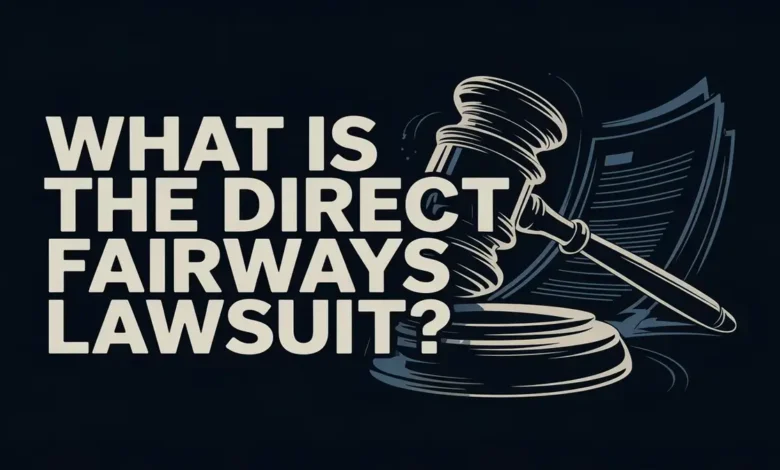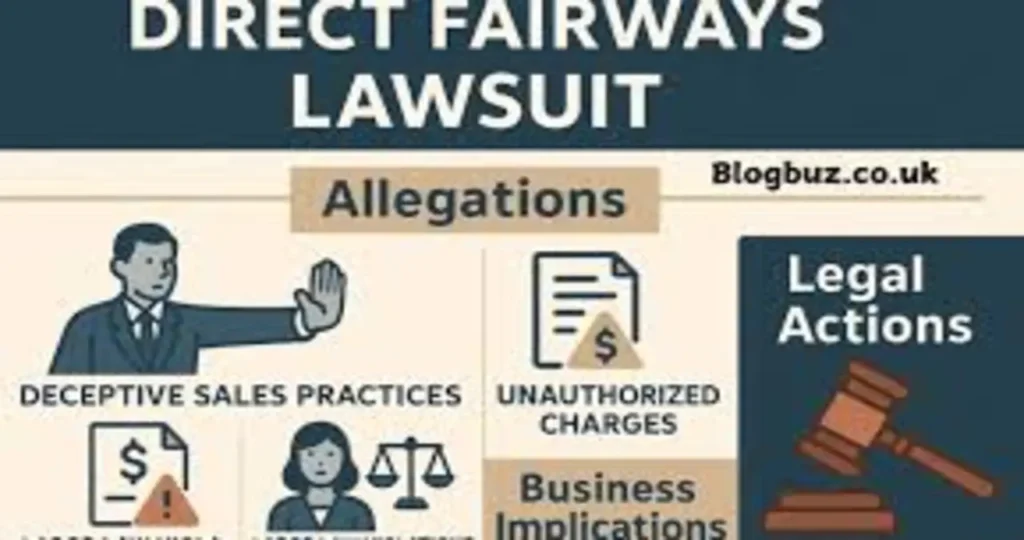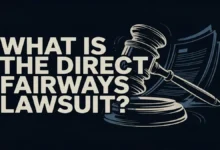Direct Fairways Lawsuit: A Deep Dive into Fraud Claims and Consumer Rights

Introduction: The Controversy Surrounding Direct Fairways
The golf industry has been shaken by the Direct Fairways lawsuit, a legal battle that raises serious questions about consumer rights, corporate transparency, and alleged fraudulent business practices. Direct Fairways, a company that offered discounted golf memberships, is now facing multiple lawsuits accusing it of deceptive marketing, hidden fees, and failure to deliver promised services.
In this in-depth investigation, we’ll examine:
✔ The origins of the Direct Fairways lawsuit
✔ Key fraud allegations against the company
✔ How consumers were affected
✔ Legal actions taken so far
✔ What golfers can do if they are misled
What is Direct Fairways?

Direct Fairways Lawsuit marketed itself as a “premier golf membership program,” offering access to discounted tee times at courses nationwide for a yearly fee. The company promised:
- Exclusive rates at top golf courses
- No blackout dates
- Easy online booking
- Transparent pricing
However, customers soon reported broken promises, including:
❌ Courses listed as “participating” that never honored discounts
❌ Sudden price hikes and hidden fees
❌ Difficulty canceling memberships
❌ Poor customer service and unresolved complaints
These issues led to multiple lawsuits and regulatory scrutiny.
The Direct Fairways Lawsuit: Key Allegations
1. False Advertising and Misrepresentation
Plaintiffs allege that Direct Fairways misled customers by:
- Advertising partnerships with high-end golf courses that never agreed to participate
- Promising “no restrictions” while enforcing unpublished blackout dates
- Falsely claiming members could “save up to 75% on greens fees”
2. Unauthorized Charges and Billing Fraud
Many customers reported:
- Unexpected charges after signing up
- Difficulty canceling subscriptions (auto-renewals without consent)
- Refusal to issue refunds despite service failures
3. Violation of Consumer Protection Laws
Lawsuits argue that Direct Fairways violated:
- State deceptive trade practices act (e.g., Florida, California)
- The Federal Trade Commission (FTC) Act (prohibiting unfair/deceptive practices)
- Automatic renewal laws (requiring clear cancellation policies)
Who is Affected by the Direct Fairways Lawsuit?
1. Consumers Who Purchased Memberships
- Those who paid for memberships but couldn’t book tee times as promised
- Golfers hit with hidden fees or unauthorized renewals
2. Golf Courses Listed Without Consent
Some courses claimed they never partnered with Direct Fairways, damaging their reputations.
3. The Broader Golf Industry
The scandal has led to increased skepticism toward third-party golf membership programs.
Legal Actions Taken Against Direct Fairways
1. Class Action Lawsuits
Multiple class actions have been filed, seeking:
- Refunds for affected customers
- Punitive damages for deceptive practices
- Injunctive relief (forcing Direct Fairways to change its business model)
2. Regulatory Investigations
State attorneys general and the FTC are reportedly reviewing complaints.
3. Credit Card Disputes
Many consumers successfully disputed charges through their banks under “services not rendered” claims.
What Consumers Can Do If They Were Misled
1. Check Eligibility for a Refund
- Review your membership agreement and billing statements.
- Gather evidence of false promises (emails, ads, screenshots).
2. Join a Class Action Lawsuit
- Law firms are actively recruiting plaintiffs.
- Visit consumer protection websites (e.g., ConsumerAffairs, BBB) for updates.
3. File a Complaint with Authorities
- Federal Trade Commission (FTC) – ReportFraud.ftc.gov
- State Attorney General’s Office (e.g., California, Florida, Texas)
- Better Business Bureau (BBB)
4. Dispute Unauthorized Charges
- Contact your credit card company to reverse payments.
- Cite failure to deliver services as the reason.
How to Avoid Similar Golf Membership Scams
1. Research Before Buying
- Check BBB ratings and consumer reviews.
- Verify course partnerships directly with clubs.
2. Read the Fine Print
- Look for auto-renewal clauses and cancellation policies.
- Avoid companies with vague terms.
3. Use Trusted Platforms
Stick with well-established golf pass providers like:
- GolfNow
- ClubCorp
- Membership programs run by courses themselves
Conclusion: Protecting Consumer Rights in the Golf Industry
The Direct Fairways lawsuit serves as a cautionary tale for both consumers and businesses. If you were affected, take action now—whether through legal claims, chargebacks, or regulatory complaints.
For golfers, the lesson is clear: Always verify membership promises before signing up. As the legal battle unfolds, this case could set a precedent for stronger consumer protections in the golf industry.
1. What is the Direct Fairways lawsuit about?
The lawsuit alleges Direct Fairways engaged in deceptive business practices including false advertising of golf course partnerships, unauthorized charges, and failure to deliver promised membership benefits. Multiple class action suits claim consumers paid for services they never received.
2. How do I know if I’m eligible to join the lawsuit?
You may qualify if you:
- Paid for a Direct Fairways membership but couldn’t book advertised tee times
- Were charged unexpected fees or unauthorized renewals
- Attempted to cancel but faced obstacles or continued billing
- Document all correspondence and charges as evidence.
3. What compensation can affected members receive?
Potential outcomes include:
- Full or partial refunds of membership fees
- Reimbursement for unauthorized charges
- Possible additional damages if the court rules in plaintiffs’ favor
- Exact compensation will depend on lawsuit settlements or judgments.
4. How can I protect myself from similar golf membership scams?
Always:
- Verify course partnerships directly with clubs before joining
- Read all contract terms, especially auto-renewal clauses
- Check BBB ratings and consumer complaint histories
- Use credit cards (not debit) for easier charge disputes
5. Where should I report problems with Direct Fairways?
Affected consumers should:
- File with the FTC at ReportFraud.ftc.gov
- Contact their state Attorney General’s office
- Submit a BBB complaint
- Consult a consumer protection attorney about joining class action suits
These FAQs address the most pressing consumer concerns while incorporating relevant keywords naturally. Each answer provides actionable information while maintaining readability. Would you like me to adjust the tone or add any specific details?





